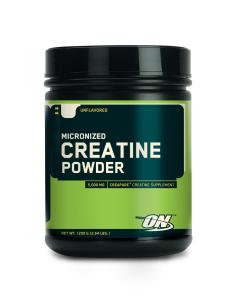Whether you’re an athlete, building some body, or an elderly person, you should be taking this supplement. While I’m a huge skeptic of 99% of supplements (science agrees) and think they’re largely overpriced garbage that you will soon wee out, I (and again science) think that this supplement can be fantastic. Fantastico to be exact. So which supplement am I talking about? Well I’m talking about creatine. Yes, humble creatine.
What is creatine and how does it work?
Truly a superb question. Creatine is a naturally occurring molecule that the body makes from two separate amino acids (protein building blocks). These amino acids, or creatine itself, can be found in meat products. However, creatine is one of the few nutrients that cannot reach optimal levels with diet alone. Drat! It is a non-essential nutrient, so if you don’t get enough of it, it’s not going to kill you, it will just alter your athletic performance slightly. For this reason, creatine supplements exist.
I’m going to skimp on the science – partly explained below – but basically creatine optimises the energy available for explosive, powerful tasks like lifting weights. It does this by replenishing the energy system predominantly required for these tasks.
Does it really work?
Yes, but only in certain circumstances.
Muscle mass:
As creatine replenishes the energy to perform short, powerful tasks it should, in theory, increase weightlifting performance and make you buff/ripped/huge/massive.
A review paper, that pooled the results of multiple studies, found creatine supplementation combined with resistance training increased muscle mass, strength and functional performance in the elderly moderately more than resistance training alone (1). Great, but what if you’re not an elderly person? Let’s face it you’re probably not. Don’t stress, creatine has been shown in multiple studies to increase muscle mass slightly to moderately in younger adults when combined with resistance training (2, 3). You beauty, you bloody beauty!
Sports performance:
Because creatine replenishes the short-term energy system, it improves short, powerful sports performance, hence the increases in muscle size when doing weights. For example, it has been demonstrated to improve 50 metre swimming time (4). However, because of it’s short term effects it does not improve performance of endurance tasks, with a study demonstrating this in long distance swimmers (4). Sorry, marathoners.
But, is it safe?
It appears to be safe unless you have a pre-existing kidney condition. A large-scale review study (a good one) found creatine to be safe for use when less than 3g of creatine supplement was consumed daily. Above that dose, it was unsafe for use only in those with pre-existing kidney issues (7). There have been concerns about creatine exacerbating asthma symptoms and cancer, but there’s no scientific data whatsoever to substantiate this.
I should note, however, that creatine attracts water molecules, so it can lead to short term water retention. If you have a clinical condition where you’re retaining water, then obviously creatine isn’t for you. The positive side to this, though, is that the water weight will make you look pretty chiseled even if you’re not! Hot tip, gentlemen.
Practical tips:
Creatine stores can be saturated by taking 5g, 4-5 times daily for the first 5-7 days. After this point 3-5g of creatine can be taken once daily to maintain stores (5). Creatine should be taken with 100g of carbohydrate like orange juice to maximise uptake (5). Once you get to the once daily maintenance phase, creatine consumption appears more effective when it is consumed post-workout (6). Oh and I have some bad news, a small proportion of individuals don’t respond to creatine, so if you’re not “massive” yet, then maybe put it down to that!
Is it healthful:
If your kidneys ain’t busted and you’re: shifting steel, lifting lead, pumping iron, or pushing platinum, then creatine supplementation may lead to slight to moderate improvements in muscle mass. If you’re a power athlete creatine might also slightly improve your performance. Try also taking protein powder for maximum benefits and heck, you might even be able to jump over that building after all.
Our verdict: Slightly to moderately healthful, but you’ve still got to lift weights.
I hope this has been healthful.






I knew about the effects of creatine, but this is brilliant! I love how you tailor to different people and use fact to prove it works!
LikeLiked by 1 person
Thanks, Kallum. Really appreciate the feedback!
LikeLiked by 1 person
Reblogged this on Recked with Finn West and commented:
For those trying to get into shape and build some muscle, here is an interesting insight on creatine.
I am currently using creatine and it has made a massive difference.
Finn
LikeLiked by 1 person
Remember that there are different types of creatine. Some people respond to creatine better taken before; some during and some after their workouts. WATER consumption is EXTREMELY important as well. It is easy to damage the heart and kidneys if dehydrated. Creatine is a good product and well worth the expense. Great review!
LikeLiked by 1 person
Yeah good point, something I failed to mention in the blog. Thanks too much!
LikeLiked by 1 person
Creatinine has damaged kidney of one of my client ,its not safe ,I always suggest go natural GI slow ,everyone has his own genetics so a dear will not become a lion taking creatinine
LikeLike
There is a systematic review that has found creatine supplementation to be safe when not consumed excessively, or not consumed by those with pre existing kidney conditions.
That is true, but it will offer mild improvements to anaerobic training forms.
LikeLike
Reblogged this on Is it healthful?.
LikeLike
Reblogged this on SnapBack and commented:
With the aging of our population around the world I think the creatine question is a significant one for longevity. The deterioration of muscle mass as we age and the resulting lack of strength is as much a pschological burden on our aging generations as other degenerative issues may be. The strength to to be active in your daily life is an extremely important asset as it often can provide the mental strength to overcome other challenges. The creatine option I think has important implications for both quality and durationn of life as we age.
LikeLike